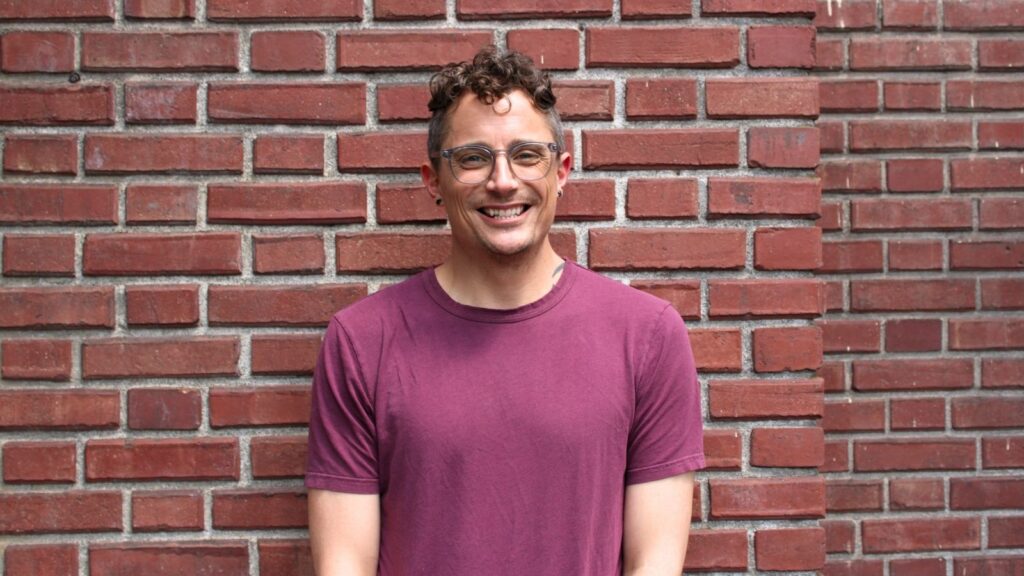ND-Research alumnus champions a future where traditional medicine and evidence-based education thrive together.

The National University of Natural Medicine (NUNM) has hired adjunct faculty member Dr. Brice Thompson as assistant professor, effective July 1.
Thompson has served as adjunct faculty for NUNM’s College of Classical Chinese Medicine since 2021 and also taught courses in the School of Undergraduate and Graduate Studies and College of Naturopathic Medicine.
As a full-time faculty member, Thompson will expand his teaching responsibilities to include medical biochemistry and evidence-based medicine coursework for the Doctor of Naturopathic Medicine program, building on prior experience as a lecturer in pharmacology.
Dr. Heather Zwickey, NUNM’s provost and vice president of research and academic excellence, made the announcement in May.
“Dr. Thompson brings a unique blend of clinical insight and scientific innovation, shaped by his research at the University of Washington and leadership as Chief Scientific Officer (CSO) at Thaena,” Zwickey said. “His ongoing research and teaching at NUNM are already making a mark, and we’re excited for what’s to come.”
In 2018, Thompson earned his Doctor of Naturopathic Medicine and master’s degree in integrative medical research from NUNM and began postdoctoral training in the Building Research across Inter-Disciplinary Gaps (BRIDG) program—a collaboration between the University of Washington and NUNM’s Helfgott Research Institute.
As the CSO and director of science and manufacturing at Thaena Inc., he supported the development of a human-derived postbiotic supplement. He was also a part-time physician at Biome Basics (formerly Flora Medicine), where he specialized in gut health services.
As he steps into his full-time role, he shares his enthusiasm about guiding the next generation of NUNM graduates.
“From my experience teaching and conducting research at NUNM, I see a growing emphasis on rigorous scientific methodology alongside our traditional holistic approach,” Thompson said. “The profession is evolving to embrace new technologies and research methods.”
Dr. Brice Thompson discussed with NUNM becoming a full-time faculty member, how he discovered naturopathic medicine, and his goals for the future.
NUNM: What led you to naturopathic medicine?
Thompson: Marathon training and a lengthy course of acne antibiotics really took a toll on my gut during my undergraduate years. Suddenly, it felt like every meal was causing GI pain. My gastroenterologist reassured me that “diet won’t help much,” but I just couldn’t accept that—certain foods clearly brought on discomfort, and that seemed pretty straightforward to me.
I sought help from a naturopathic doctor (Dr. Mary Rondeau) who was recommended by my lab PI. Initially, I was quite skeptical. What was a naturopathic doctor (ND)? It sounded a bit too “woo” for my taste, but I decided to give her a shot. After a comprehensive look at my health history, a discussion about food sensitivities, and a few journal articles for homework, we crafted a really challenging elimination diet that incorporated some supplements. And—boom—I could start enjoying food again without the pain!
During my follow-up, the gastroenterologist scoffed when I shared that I was feeling better thanks to the care of an ND. But I pointed to the scoreboard: my ND, whose treatment plan actually provided me with relief, against his lifelong IBS diagnosis. That was the turning point when I knew I wanted to become an ND myself.
What inspired you to pursue research at NUNM?
My dual ND-MS degree at NUNM showed me how solid data can sharpen integrative practice—and how many questions are still unanswered, especially around herb–drug interactions. An NIH-funded BRIDG fellowship at the University of Washington let me dive deeper into clinical pharmacology and natural-product pharmacokinetic (PK) methods. After a stint in industry building good manufacturing practice systems and contract studies for a microbiome startup, I missed academia’s curiosity engine.
When I was invited back to Helfgott to launch company-sponsored trials, I jumped at the opportunity. Now, I get to merge teaching and research to expand the evidence base that NDs rely on.
Do you have any upcoming research or teaching plans you’re looking forward to?
Totally! This fall, I’ll inherit the Medical Biochemistry series. It’s my chance to honor Dr. Dangerfield’s rigor and talent while adding a bit of my trademark sarcastic humor—because who doesn’t love the Krebs cycle?
Recently, I co-designed a case-based learning model with Dr. Dee Saunders for our gastroenterology tutorial that weaves AI directly into the assignments. Even with this first, limited rollout, the process has been a blast and early feedback suggests students really enjoy it.
I’m also currently supporting fellow investigators in getting their clinical trials across the finish line and looking forward to launching my first PK study on a new dietary supplement in the Fall.
What makes you excited about where the profession is headed?
What’s particularly encouraging is how the next generation of naturopathic physicians is being trained to bridge the gap between conventional and natural medicine. They’re learning to be critical thinkers who can evaluate scientific evidence while maintaining the patient-centered, holistic approach that makes our profession unique.
I’m optimistic about how our profession is positioning itself to address modern healthcare challenges. As we face increasing complexity in chronic diseases and growing interest in personalized medicine, NDs are uniquely qualified to provide comprehensive care and this puts us at the forefront of developing innovative solutions for contemporary health challenges.
Written by Ashley Villarreal, NUNM Marketing Content Specialist, in collaboration with Dr. Brice Thompson.